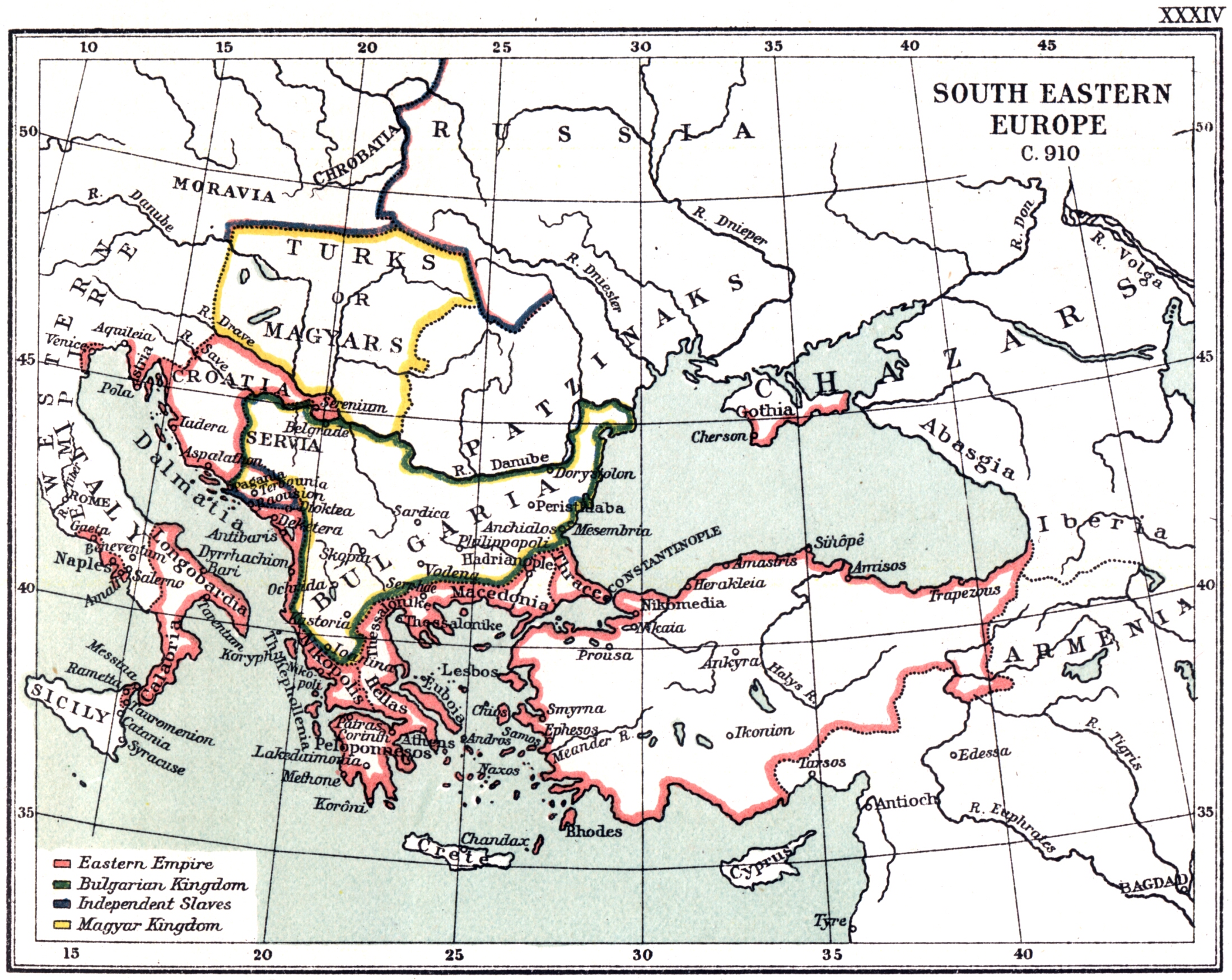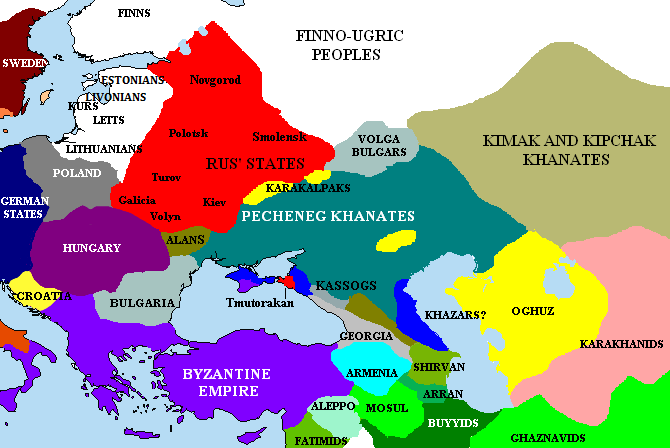|
Battle Of Silistra
The Battle of Silistra occurred in the spring of 968 near the Bulgarian town of Silistra, but most probably on the modern territory of Romania. It was fought between the armies of Bulgaria and Kievan Rus' and resulted in a Rus' victory. Upon the news of the defeat, the Bulgarian emperor Peter I abdicated. The invasion of the Rus' prince Sviatoslav was a heavy blow for the Bulgarian Empire, which by 971 lost its eastern provinces to the Byzantine Empire. Origins of the conflict From the 940s the Magyars began repeatedly to launch pillage raids into the Bulgarian Empire. Emperor Peter I was unable to stop them and as the Byzantines were unwilling to send any help he finally allied with the Magyars and gave them safe passage through Bulgaria to attack Byzantine Thrace. In 968 the Byzantine emperor Nikephoros II Phokas paid the Kievan knyaz Sviatoslav Igorevich to attack Bulgaria in answer of the alliance between the Bulgarian emperor Peter I and the Magyars. Battle Sviatosla ... [...More Info...] [...Related Items...] OR: [Wikipedia] [Google] [Baidu] |
Sviatoslav's Invasion Of Bulgaria
Sviatoslav's invasion of Bulgaria was a conflict beginning in 967/968 and ending in 971, carried out in the eastern Balkans, and involving the Kievan Rus', Bulgaria, and the Byzantine Empire. The Byzantines encouraged the Rus' ruler Sviatoslav to attack Bulgaria, leading to the defeat of the Bulgarian forces and the occupation of the northern and north-eastern part of the country by the Rus' for the following two years. The allies then turned against each other, and the ensuing military confrontation ended with a Byzantine victory. The Rus' withdrew and eastern Bulgaria was incorporated into the Byzantine Empire. In 927, a peace treaty had been signed between Bulgaria and Byzantium, ending many years of warfare and establishing forty years of peace. Both states prospered during this interlude, but the balance of power gradually shifted in favour of the Byzantines, who made great territorial gains against the Abbasid Caliphate in the east and formed a web of alliances surrounding Bu ... [...More Info...] [...Related Items...] OR: [Wikipedia] [Google] [Baidu] |
Bulgarians
Bulgarians (, ) are a nation and South Slavs, South Slavic ethnic group native to Bulgaria and its neighbouring region, who share a common Bulgarian ancestry, culture, history and language. They form the majority of the population in Bulgaria, while in Bulgarians in North Macedonia, North Macedonia, Bulgarians in Ukraine, Ukraine, Bessarabian Bulgarians, Moldova, Bulgarians in Serbia, Serbia, Bulgarians in Albania, Albania, Bulgarians in Romania, Romania, Bulgarians in Hungary, Hungary and Bulgarians in Greece, Greece they exist as historical communities. Etymology Bulgarians derive their ethnonym from the Bulgars. Their name is not completely understood and difficult to trace back earlier than the 4th century AD, but it is possibly derived from the Proto-Turkic word ''*bulģha'' ("to mix", "shake", "stir") and its derivative ''*bulgak'' ("revolt", "disorder"). Alternative etymologies include derivation from a compound of Proto-Turkic (Oghuric languages, Oghuric) ''*bel'' ("fi ... [...More Info...] [...Related Items...] OR: [Wikipedia] [Google] [Baidu] |
10th Century In Kievan Rus'
1 (one, unit, unity) is a number, numeral, and glyph. It is the first and smallest positive integer of the infinite sequence of natural numbers. This fundamental property has led to its unique uses in other fields, ranging from science to sports, where it commonly denotes the first, leading, or top thing in a group. 1 is the unit of counting or measurement, a determiner for singular nouns, and a gender-neutral pronoun. Historically, the representation of 1 evolved from ancient Sumerian and Babylonian symbols to the modern Arabic numeral. In mathematics, 1 is the multiplicative identity, meaning that any number multiplied by 1 equals the same number. 1 is by convention not considered a prime number. In digital technology, 1 represents the "on" state in binary code, the foundation of computing. Philosophically, 1 symbolizes the ultimate reality or source of existence in various traditions. In mathematics The number 1 is the first natural number after 0. Each natural number, ... [...More Info...] [...Related Items...] OR: [Wikipedia] [Google] [Baidu] |
History Of Silistra
Silistra ( ; ; or ) is a town in Northeastern Bulgaria. The town lies on the southern bank of the lower Danube river, and is also the part of the Romanian border where it stops following the Danube. Silistra is the administrative center of the Silistra Province and one of the important towns of the historical region of Dobruja. Silistra is a major cultural, industrial, transportation, and educational center of Northeastern Bulgaria. There are many historical landmarks including a richly-decorated Late Roman tomb, remains of the medieval fortress, an Ottoman fort, and an art gallery. Etymology The name Silistra is possibly derived from the root of the old Thracian name of the lower part of the Danube "Istrum". The name of the city is given as ''Silistria'' in the ''Encyclopædia Britannica'' Eleventh Edition. Geography Silistra is in the northeastern part of Bulgaria on the southern bank of the Danube River. It is located in the Bulgarian part of Dobruja. The municipa ... [...More Info...] [...Related Items...] OR: [Wikipedia] [Google] [Baidu] |
Battles Involving Kievan Rus'
A battle is an occurrence of combat in warfare between opposing military units of any number or size. A war usually consists of multiple battles. In general, a battle is a military engagement that is well defined in duration, area, and force commitment. An engagement with only limited commitment between the forces and without decisive results is sometimes called a skirmish. The word "battle" can also be used infrequently to refer to an entire operational campaign, although this usage greatly diverges from its conventional or customary meaning. Generally, the word "battle" is used for such campaigns if referring to a protracted combat encounter in which either one or both of the combatants had the same methods, resources, and strategic objectives throughout the encounter. Some prominent examples of this would be the Battle of the Atlantic, Battle of Britain, and the Battle of France, all in World War II. Wars and military campaigns are guided by military strategy, whereas batt ... [...More Info...] [...Related Items...] OR: [Wikipedia] [Google] [Baidu] |
AST (publisher)
AST () is one of the largest book publishing companies in Russia, General Director, headed by Oleg Bartenev (Олег Бартенев). It owns a bookstores chain "Bukva" (, lit. ''A Letter (alphabet), Letter''). Among AST partners are publishing companies Astrel, Zebra E, Molodaya Gvardiya (publisher), Molodaya Gvardiya, CenterCom, bookstores Moscow (publisher), Moscow and Biblio Globus and online shops, such as Ozon.ru. It also owns comic book and manga publisher Comics Factory. History The company was established in 1990 by Andrey Gertsev, Sergei Derevianko and Tatiana Derevianko as "Creative Cooperative Association AST" (). AST is an abbreviation meaning Andrey–Sergei–Tatiana. In 1993 the company was divided into AST itself, headed by Andrey Gertsev, and AST-PRESS. As of 2007, AST and its rival (later parent company) Eksmo together published approximately 30% of all Russian books. In 2008 AST purchased Avanta+. On April 19, 2012, the commercial subdivision of AST "P ... [...More Info...] [...Related Items...] OR: [Wikipedia] [Google] [Baidu] |
Pechenegs
The Pechenegs () or Patzinaks, , Middle Turkic languages, Middle Turkic: , , , , , , ka, პაჭანიკი, , , ; sh-Latn-Cyrl, Pečenezi, separator=/, Печенези, also known as Pecheneg Turks were a semi-nomadic Turkic peoples, Turkic people from Central Asia who spoke the Pecheneg language. In the 9th and 10th centuries, the Pechenegs controlled much of the steppes of southeast Europe and the Crimean Peninsula. In the 9th century the Pechenegs began a period of wars against Kievan Rus', and for more than two centuries launched raids into the lands of Rus', which sometimes escalated into full-scale wars. Ethnonym The Pechenegs were mentioned as ''Bjnak'', ''Bjanak'' or ''Bajanak'' in medieval Arabic language, Arabic and Persian language, Persian texts, as ''Be-ča-nag'' in Classical Tibetan documents, and as ''Pačanak-i'' in works written in Georgian language, Georgian. Anna Komnene and other Byzantine authors referred to them as ''Patzinakoi'' or ''Patzi ... [...More Info...] [...Related Items...] OR: [Wikipedia] [Google] [Baidu] |
Primary Chronicle
The ''Primary Chronicle'', shortened from the common ''Russian Primary Chronicle'' (, commonly transcribed ''Povest' vremennykh let'' (PVL), ), is a Rus' chronicle, chronicle of Kievan Rus' from about 850 to 1110. It is believed to have been originally compiled in or near Kiev in the 1110s. Tradition ascribed its compilation to the monk Nestor the Chronicler, Nestor (''Nestor's Chronicle'') beginning in the 12th century, but this is no longer believed to have been the case. The title of the work, ("Tale of Bygone Years") comes from the opening sentence of the Laurentian Codex, ''Laurentian'' text: "These are the narratives of bygone years regarding the origin of the land of Rus', the first princes of Kiev, and from what source the land of Rus' had its beginning". The work is considered a fundamental source for the earliest history of the East Slavs. The content of the chronicle is known today from the several surviving versions and codices, revised over the years, slightly var ... [...More Info...] [...Related Items...] OR: [Wikipedia] [Google] [Baidu] |
Pereyaslavets
Pereyaslavets ( East Slavic: ) or Preslavets () was a trade city located near mouths of the Danube. The city's name is derived from that of the Bulgarian capital of the time, Preslav, and means Little Preslav (). In Greek it was also known as Presthlavitza (). Several theories exist regarding the exact location of the city: either at Preslav or in its vicinity in Bulgaria, or at Isaccea, Nufăru, Murighiol or Jurilovca in Romania. A thriving trade centre of the First Bulgarian Empire, it was captured by Prince Svyatoslav of Kievan Rus in 968 (See Sviatoslav's invasion of Bulgaria). During Svyatoslav's absence from the city following the Siege of Kiev (968), part of the citizens revolted and opened the gate to Bulgarian forces. According to Vasily Tatischev, Svyatoslav's governor Volk managed to escape. Upon his return to Bulgaria, Svyatoslav promptly suppressed the rebellion and, to the chagrin of his mother and relatives, transferred the capital from Kiev to Pereyaslavets ... [...More Info...] [...Related Items...] OR: [Wikipedia] [Google] [Baidu] |
Epileptic Stroke
Epilepsy is a group of non-communicable neurological disorders characterized by a tendency for recurrent, unprovoked seizures. A seizure is a sudden burst of abnormal electrical activity in the brain that can cause a variety of symptoms, ranging from brief lapses of awareness or muscle jerks to prolonged convulsions. These episodes can result in physical injuries, either directly, such as broken bones, or through causing accidents. The diagnosis of epilepsy typically requires at least two unprovoked seizures occurring more than 24 hours apart. In some cases, however, it may be diagnosed after a single unprovoked seizure if clinical evidence suggests a high risk of recurrence. Isolated seizures that occur without recurrence risk or are provoked by identifiable causes are not considered indicative of epilepsy. The underlying cause is often unknown, but epilepsy can result from brain injury, stroke, infections, tumors, genetic conditions, or developmental abnormalities. Epilepsy ... [...More Info...] [...Related Items...] OR: [Wikipedia] [Google] [Baidu] |





